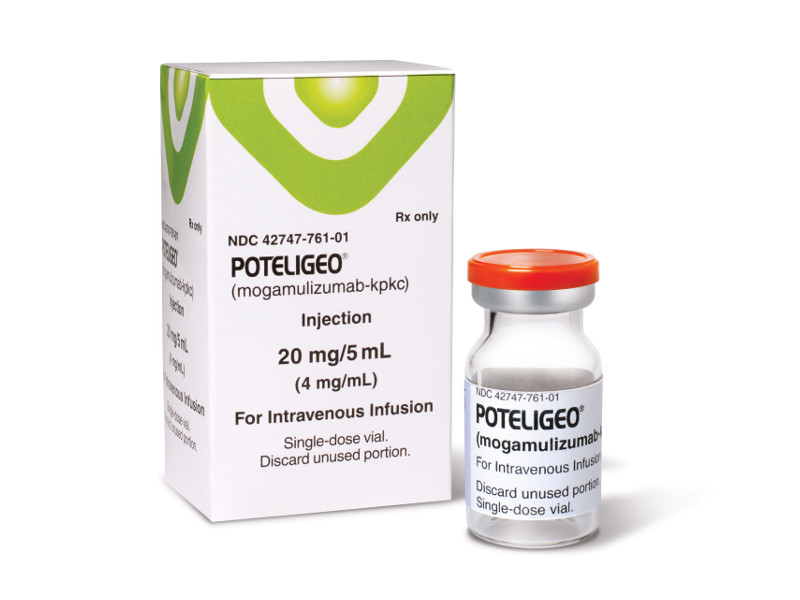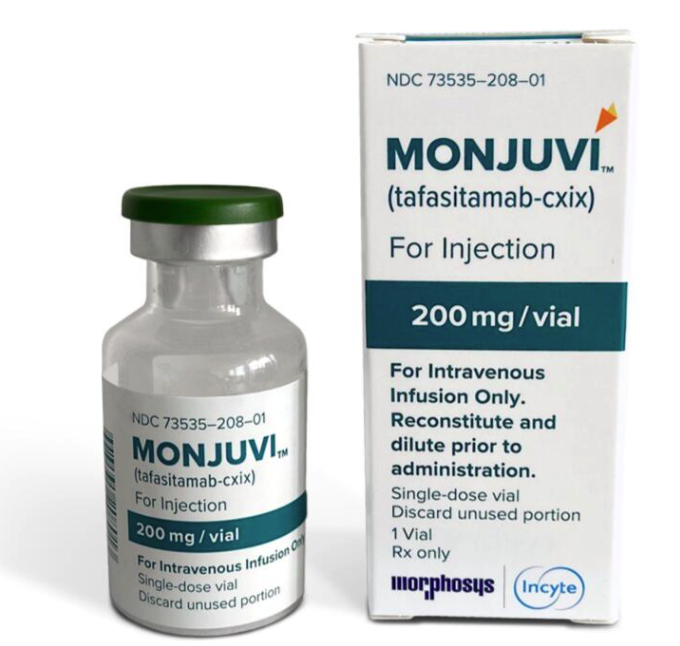Poteligeo (mogamulizumab) vs Monjuvi (tafasitamab-cxix)
Poteligeo (mogamulizumab) vs Monjuvi (tafasitamab-cxix)
Poteligeo (mogamulizumab) is a monoclonal antibody targeting the C-C chemokine receptor 4 (CCR4) and is approved for the treatment of adult patients with relapsed or refractory mycosis fungoides or Sézary syndrome, which are types of cutaneous T-cell lymphomas. Monjuvi (tafasitamab-cxix), on the other hand, is a monoclonal antibody that targets CD19, an antigen found on the surface of B-cell lymphomas, and is approved in combination with lenalidomide for the treatment of adult patients with relapsed or refractory diffuse large B-cell lymphoma (DLBCL) not otherwise specified, including DLBCL arising from low grade lymphoma, and who are not eligible for autologous stem cell transplant. When choosing between these two medications, it is crucial to consider the specific type of lymphoma being treated, as Poteligeo is used for certain T-cell lymphomas while Monjuvi is indicated for a form of B-cell lymphoma, and the decision should be made in consultation with a healthcare provider who can evaluate the individual patient's condition and treatment history.
Difference between Poteligeo and Monjuvi
| Metric | Poteligeo (mogamulizumab) | Monjuvi (tafasitamab-cxix) |
|---|---|---|
| Generic name | mogamulizumab-kpkc | tafasitamab-cxix |
| Indications | Relapsed or refractory mycosis fungoides or Sézary syndrome in adults | Relapsed or refractory diffuse large B-cell lymphoma (DLBCL) not otherwise specified, including DLBCL arising from low grade lymphoma, in adults |
| Mechanism of action | CC chemokine receptor 4 (CCR4) antagonist | CD19-directed cytolytic antibody |
| Brand names | Poteligeo | Monjuvi |
| Administrative route | Intravenous infusion | Intravenous infusion |
| Side effects | Rash, infusion reactions, fatigue, diarrhea, musculoskeletal pain | Neutropenia, thrombocytopenia, anemia, infusion-related reactions, fatigue, diarrhea, cough |
| Contraindications | Hypersensitivity to mogamulizumab or any of its excipients | Hypersensitivity to tafasitamab-cxix or any of its excipients |
| Drug class | Monoclonal antibody | Monoclonal antibody |
| Manufacturer | Kyowa Kirin Co., Ltd. | MorphoSys and Incyte |
Efficacy
Efficacy of Poteligeo (Mogamulizumab) in Treating Lymphoma
Poteligeo (mogamulizumab) is a monoclonal antibody approved by the U.S. Food and Drug Administration (FDA) for the treatment of adult patients with relapsed or refractory mycosis fungoides (MF) or Sézary syndrome (SS) after at least one prior systemic therapy. These conditions are types of cutaneous T-cell lymphoma (CTCL), a rare form of non-Hodgkin lymphoma. Clinical trials have demonstrated that mogamulizumab can lead to a significant improvement in progression-free survival (PFS) when compared to vorinostat in patients with MF and SS. The efficacy of mogamulizumab is attributed to its selective targeting of C-C chemokine receptor 4 (CCR4), which is frequently expressed on malignant T-cells in CTCL.
Efficacy of Monjuvi (Tafasitamab-cxix) in Treating Lymphoma
Monjuvi (tafasitamab-cxix) is an FDA-approved antibody for the treatment of adult patients with relapsed or refractory diffuse large B-cell lymphoma (DLBCL), not otherwise specified, including DLBCL arising from low-grade lymphoma, and who are not eligible for autologous stem cell transplant (ASCT). Tafasitamab-cxix is designed to target CD19, a protein expressed on the surface of pre-B and mature B lymphocytes and on many B-cell malignancies. When used in combination with lenalidomide, followed by Monjuvi monotherapy for patients with relapsed or refractory DLBCL, clinical trials have shown a meaningful improvement in overall response rates (ORR) and an extension in median overall survival (OS) compared to historical controls.
Both Poteligeo and Monjuvi represent advances in the targeted therapy approach for the treatment of different types of lymphoma. They offer options for patients who have limited treatments available due to the relapsed or refractory nature of their disease. The efficacy of these drugs in improving patient outcomes highlights the importance of continued research and development in the field of oncology, particularly for conditions with high unmet medical needs.
It is crucial for healthcare providers to consider the individual patient's disease characteristics and previous treatments when deciding to use these therapies. Additionally, the efficacy of these drugs must be weighed against their safety profiles, and treatment should be tailored to the specific needs of each patient. Ongoing studies and post-marketing surveillance continue to provide important data regarding the long-term efficacy and safety of these treatments for lymphoma.
Regulatory Agency Approvals
Poteligeo
-
European Medical Agency (EMA), European Union

-
Food and Drug Administration (FDA), USA

-
Therapeutic Goods Administration (TGA), Australia

Monjuvi
-
Food and Drug Administration (FDA), USA

Access Poteligeo or Monjuvi today
If Poteligeo or Monjuvi are not approved or available in your country (e.g. due to supply issues), you can access them via Everyone.org.
How it works

Make an enquiry
Choose the medicine you want to buy, answer a couple of questions, and upload your prescription to speed things up. We’ll get back to you within 24 hours.


Make an enquiry
Choose the medicine you want to buy, answer a couple of questions, and upload your prescription to speed things up. We’ll get back to you within 24 hours.


Breeze through the paperwork
We'll guide you through the required documents for importing unapproved medicine, ensuring you have all the necessary information.


Get a personalized quote
We’ll prepare a quote for you, including medicine costs and any shipping, administrative, or import fees that may apply.


Receive your medicine
Accept the quote and we’ll handle the rest - sourcing and safely delivering your medicine.

Some text on this page has been automatically generated. Speak to your physician before you start a new treatment or medication.
Let's talk
If you have any questions, call us or send us a message through WhatsApp or email:
Contact us




